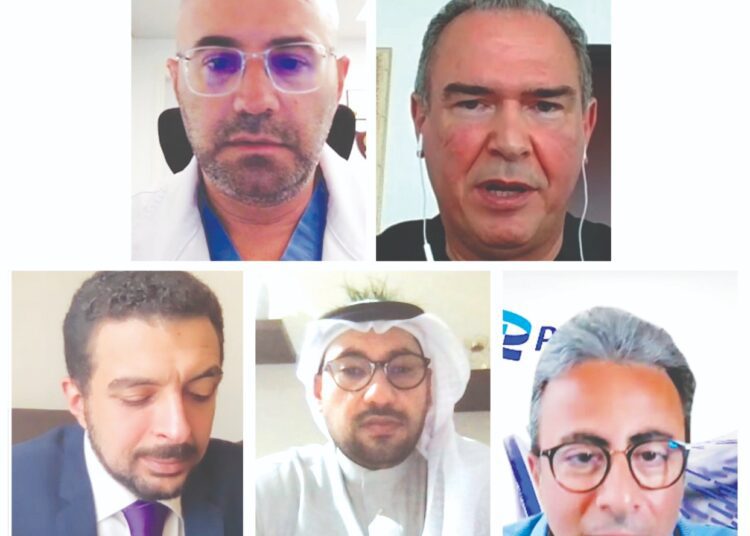By Hamed Mahmoud
To mark the occasion of World Inflammatory Bowel Disease Day (IBD), held annually on the 19th of May, Pfizer hosted a virtual media round table to raise awareness about the disease and challenges that patients living with the condition face across Africa and the Middle East. Attended by reputed medical professionals from the region, the roundtable was designed to draw attention to both the physical and emotional impact of IBD on patients.
A chronic illness, IBD, which includes both Crohn’s disease and ulcerative colitis, affects numerous patients across Africa and the Middle East. Often described by patients as painful, uncomfortable, inconvenient, and embarrassing, 84% of adults living with ulcerative colitis agree that the condition is mentally exhausting, while 30% wish their doctors better understood how the condition affects their mental health. As a result, this World IBD Day, Pfizer is encouraging patients to “break the silence” and speak to their doctor about the impact on their mental and emotional well-being, which can include anxiety and depression.
In addition to the impact of IBD on mental and emotional well-being, the medical professionals from Egypt, Saudi Arabia, UAE and Lebanon discussed a broad range of topics related to the disease, including signs and symptoms, the differences between Crohn’s disease and ulcerative colitis, the importance of early diagnosis, the impact of patient gender and age on the condition, best practices in handling IBD patients, the role of patient and advocacy groups, as well as the latest scientific advances and treatments to improve patients lives.
Dr. Mohammed Khorshid, President of Egyptian Developers of Gastroenterology and Endoscopy, Egypt, commented: “Characterized by chronic inflammation of the gastrointestinal (GI) tract, common symptoms of IBD include persistent diarrhea, abdominal pain, rectal bleeding or bloody stools, weight loss and fatigue. While Crohn’s disease can affect any part of the GI tract, ulcerative colitis impacts the large intestines and the rectum. It is important that all medical practitioners make sure they are familiar with the symptoms to ensure correct diagnosis and proper treatment.”
Dr. Yasser Meralam Consultant Gastroenterology, Hepatology, Endoscopy, and Inflammatory Bowel Disease King Abdullah Medical City, Saudi Arabia, added: “Raising awareness around IBD is critical so that medical practitioners ensure early referrals and correct diagnosis, and subsequently patients receive the right care. It is important that patients with IBD are correctly handled and monitored in terms of their physical and psychological symptoms, as the theme of this year’s IBD day – “break the silence” – suggests. However, it is only with proper awareness among the community that patients will feel comfortable sharing how this disease impacts their daily lives.”
Dr. Ahmad Jazzar, Consultant Physician, Chief of the Gastroenterology Division, Sheikh Khalifa Medical City, United Arab Emirates, commented: “Our priority is to ensure that patients with IBD receive the best care possible. While conventional therapies, including anti-inflammatory drugs and corticosteroids, are a critical form of first-line treatment, side effects and intolerance can both prove challenging. With newer advanced therapies now available, we are able to help more patients as well as improve general patient adherence.”
Dr. Cecilio R. Azar, Clinical Associate, Division of Gastroenterology, Clemenceau Medical Center (CMC), Consultant Gastroenterology and Hepatology, Middle East Institute of Health (M.E.I.H), Lebanon, commented: “With many IBD patients suffering from anxiety and depression on account of their condition, we must acknowledge the impact the disease has on psychological well-being. Considering the implication of gut health on the brain, linked as they are through a complex system of nerves and biochemical signals, it is not only the social implications of the disease that impact mental well-being. In recognition of this fact, we want to encourage patients to break the silence, speak with their doctors and ask them for their support. By asking for help, doctors can connect patients with advocacy and patient support groups, which are an ideal forum for sharing experiences and helping patients alleviate the psychological burden of IBD and reducing feelings of isolation. These can be vital to the creation of a roadmap to get back a sense of emotional well-being after suffering from a chronic disease such as IBD.”
Yasser El Dershaby, Vice President of Pfizer and Medical Affairs Lead for Africa and Middle East Region, commented: “As a chronic disease impacting both physical and psychological well-being, patients with IBD can face a lifetime of challenges impacting both work productivity and relationships if not properly managed. The invisibility of the disease can make it particularly challenging for patients to communicate the negative impact that IBD can have on their day-to-day lives. In line with our commitment to improve patients’ lives, this World IBD Day we are focusing on not only raising awareness about the condition but on empowering patients. As part of these efforts, I want to thank the involvement of everyone who participated in our virtual roundtable to encourage patients to ‘break the silence’ and speak out about the impact of the disease in terms of well-being.”






Discussion about this post